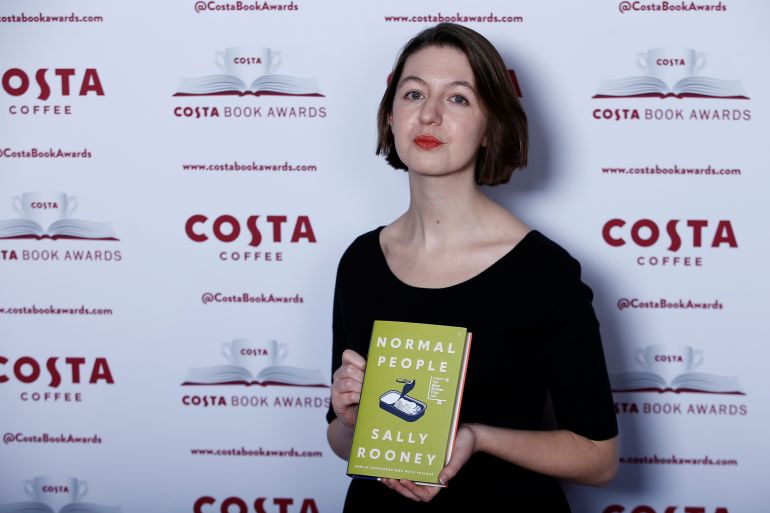An open letter to Sally Rooney from Gaza
Your act of solidarity gave us some true hope, and we are thankful for it.

Dearest Ms Rooney,
I am a Palestinian-South African academic teaching literature at Al-Aqsa University of Gaza. I wish to salute you for your principled decision to not grant Israeli publisher Modan the right to translate your novel Beautiful World, Where Are You? and violate the cultural boycott of Israel – a key aspect of the general Boycott, Divestment and Sanctions (BDS) call from Palestinian civil society.
Keep reading
list of 4 itemsUS returns ancient artefacts looted from Cambodia, Indonesia
Mandela’s world: A photographic retrospective of apartheid South Africa
Portrait by Gustav Klimt sells for $32m at Vienna auction
The moment we learned about your decision in Gaza, we celebrated, with an obvious relief, the fact that someone of your calibre is hearing our voices. Such relief has become a rare commodity since Israel imposed a medieval blockade on our tiny strip over a decade ago.
Every single day we are faced with new challenges and escalating difficulties in this open-air prison once known for its beauty, historical sites, cultural hideaways and vibrant commerce.
As I am penning this letter to you, Gaza is once again in darkness. Hours-long, daily power cuts are now an ordinary part of our lives in this besieged city.
Since 2009, Israel has carried out four massacres in Gaza. The latest one, in May, resulted in the deaths of 260 people, including 67 children.
We are anxious, frustrated and angry.
But your act of solidarity gave us some true hope. It made us realise that there are still people in this world who acknowledge our suffering – who refuse to turn their backs on our call for justice.
Nobel Peace Prize laureate and anti-apartheid activist Archbishop Desmund Tutu famously said: “If you are neutral in situations of injustice, you have chosen the side of the oppressor. If an elephant has its foot on the tail of a mouse, and you say that you are neutral, the mouse will not appreciate your neutrality.”
You, by listening to our call to boycott all attempts to whitewash Israel’s crimes against our people, made it clear that you have chosen to be on the side of the oppressed. And we, the Palestinians, are eternally grateful.
After more than seven decades of dispossession, ethnic cleansing, massacres, and what amounts to an international conspiracy of silence about Israel’s crimes, we are still resisting our oppressors in every way we can. But we need support – we need the international community to acknowledge its responsibility to stand against the crimes being committed against us with impunity.
Our demands are simple. We want Israel to comply with international law and respect the most basic human rights of Palestinians.
To show that it respects international law, Israel needs to:
- end the occupation of the Gaza Strip and the West Bank, including Eastern Jerusalem
- revoke discriminatory laws and policies hindering the lives of its 1.2 million Palestinian citizens
- implement UN resolution 194 calling for the return of Palestinian refugees to their ancestral lands
The Palestinian civil society made the BDS call to encourage people of conscience around the world, like yourself, to speak up and play an effective role in the Palestinian struggle for justice. It means a lot to us that you heeded our call.
In my classes, I often teach the novels and short stories of Ghassan Kanafani – a renowned Palestinian writer who was assassinated by Mossad in 1972 for writing literature that encouraged Palestinians to resist their oppressors.
Coincidentally, when we heard the news of your principled decision, I was discussing Kanafani’s well-known novella, Man In the Sun, with my students.
The novella, written just a decade after the 1948 Nakba, tells the story of three Palestinians in Iraq trying to smuggle themselves into Kuwait to find employment. In the end, they suffocate in the tank of the lorry smuggling them – and in this not so “beautiful world”, not a single person hears their dying screams.
The grim ending of Kanafani’s novella is a reminder of the importance of solidarity – the importance of hearing the “screams” of ordinary people in need. After all, if those screams fall on deaf ears, we are all doomed to extinction.
So when I heard about your decision as I was discussing this story with my students, I saw it as a teaching opportunity.
I told my students, who are all refugees living in Gaza’s camps and who are all suffering under Israel’s occupation, that the world is changing. That a famous, talented, influential Irish novelist is hearing the screams of the grandsons and granddaughters of those men who suffocated alone in the Gulf dessert in Kanafani’s story.
It felt as if you were there in the same Gaza classroom with us, reading the words of Kanafani, and responding, “I hear you!”
By heeding our call, by listening to our plight, by bravely refusing to be part of Israel’s efforts to whitewash its crimes, you joined a long list of artists who prioritise their principles and commitment to human rights over immediate personal gains.
And for this, we thank you from the bottom of our hearts.
The views expressed in this article are the author’s own and do not necessarily reflect Al Jazeera’s editorial stance.
